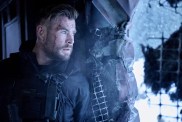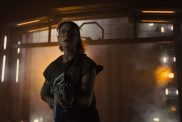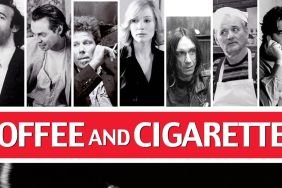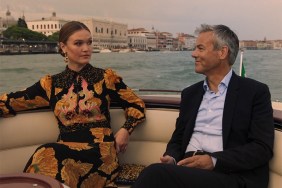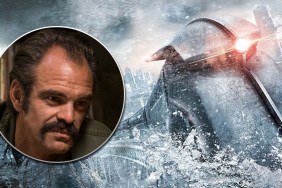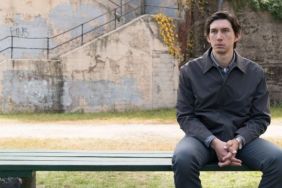
Roberto Benigni
Cate Blanchett
Steve Buscemi
Steve Coogan
Isaach De Bankolé
Alex Descas
Renee French
Genius/GZA
Cinqué Lee
Joie Lee
Taylor Mead
Alfred Molina
Bill Murray
Iggy Pop
William Rice
Joseph Rigano
E.J. Rodriguez
RZA
Vinny Vella Jr.
Vinny Vella
Tom Waits
Jack White
Meg White
Steven Wright
Story:
In 1986, Jim Jarmusch was asked by Saturday Night Live producer Lorne Michaels to direct a short film for the show. The result of that request, a film called “Coffee and Cigarettes” featured Italian film star Roberto Benigni and comic Steven Wright having a strange meeting in a coffeehouse. While shooting Mystery Train three years later, Jarmusch filmed another short with Steve Buscemi and Joie and Cinque Lee, and a few years after that, he did a third with Iggy Pop and Tom Waits. The shorts were originally done for the film festival circuit, but in 2003, Jarmusch decided to compile those shorts into a feature length piece, filming six more films using similar themes. Coffee and Cigarettes is a culmination of eighteen years of these short films.
Analysis:
It has been five years since Jim Jarmusch’s last feature film, Ghost Dog: The Way of the Samurai, and Coffee and Cigarettes is an interesting stopgap to remind people of why he is considered one of the more inventive independent filmmakers. Shot in black and white using an impressive roster of cinematographers, the principle for the shorts is simple: take two or more actors, actresses or celebrities, put them in a coffee shop together-some of them meeting for the first time–and see what happens. Everyone plays themselves or a version of themselves, with each segment based loosely around a Jarmusch script. Most of the encounters tend to be awkward or argumentative, but Jarmusch’s sharp and clever dialogue is always prevalent. It’s a bit of a throwback to Jarmusch’s 1991 film, Night on Earth, which was also made up of unrelated but similar segments.
The divergent personalities of Steven Wright and Roberto Benigni sets things up well, with Benigni’s hyped up personality not requiring the same amount of caffeine as Wright’s deadpan delivery. Steve Buscemi plays a waiter in a Memphis coffee shop getting on the nerve of two patrons played by Joie and Cinque Lee in the second segment, but it seems a bit more ragtag, despite Buscemi’s amusing story about Elvis’ evil twin. It’s fun seeing musical veterans like Tom Waits and Iggy Pop meeting face-to-face in the third segment, but it’s more apparent that neither is an actor, as the encounter seems the most like it was read from a script.
Things start to falter around the midpoint of the movie with the quality of the acting and writing getting more erratic as things go along. Some of the segments seem pointless and not very well thought out. The bit with the two Italian American actors is fun, but underground comic artist Renee French sitting in a coffee shop drinking coffee with almost no dialogue served little purpose. The point of the White Stripes discussion of Tesla coils was also lost on me.
After that lull, the newest segments are thankfully some of the best, maybe because Jarmusch had a bit more time to work on the casting and writing. The most entertaining of them features Alfred Molina and Steven Coogan as two Brit actors meeting for the first time in a Los Angeles café. (The piece is so good that it’s forgivable that the segment was actually shot in Brooklyn.) Molina plays a gushing fan of Coogan, a well-known star in his native England, but the latter seems genuinely disinterested, until a hilarious table-turning twist. That piece links to one starring Cate Blanchett in a dual role, playing herself and her punky cousin Shelly, whose jealousy of her cousin’s fame is obvious as they sit in a hotel lobby catching up. The performances are so good that you won’t believe that they’re both Blanchett. The biggest surprise is the odd pairing of Bill Murray, inexplicably waiting tables at a restaurant, with GZA and RZA from the Wu Tang Clan. At first, it would seem to be repetitive of the earlier Buscemi vignette, but it turns out to be one of the most outwardly funniest pieces. The final segment with Jarmusch pals Taylor Mead and Bill Rice is a bit subtle, but ending with two lifelong friends makes for an interesting counterpoint to the argumentative earlier scenes.
Despite the weak middle section, Jarmusch’s attention to detail and his choice of settings and background music for the encounters keeps the movie fresh. Each conversation is showcased by a visually gorgeous look and style, using overhead shots and close-ups to contrast the different settings and personalities. A number of recurring themes run through the movie to help maintain cohesion between the vignettes, and the small touches make the overall concept that much more enjoyable.
The film’s biggest annoyance is that it tries too hard to be a barometer of cool, making it mandatory to know the participants or their work. Sadly, not knowing who someone is will make you less interested in what they have to say.
The Bottom Line:
The epitome of a talking heads movie, Coffee and Cigarettes is an interesting concept, but with less than half of the segments being amusing or memorable, it’s debatable whether the movie as a whole is worthwhile. Jarmusch fans that have waited patiently for another insightful or thought-provoking film may be disappointed by the movie’s minimal story that runs between them. The biggest irony is that smoking was banned in New York restaurants and coffee shops by the time Jarmusch got around to finishing this rather odd concept film, but some of the newest shorts make you glad that he didn’t take that as a hint.

